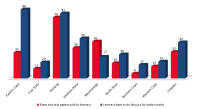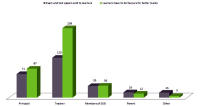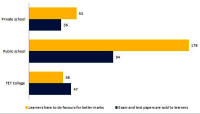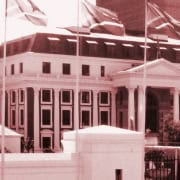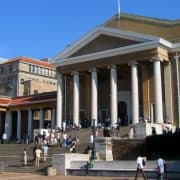|
Getting your Trinity Audio player ready...
|
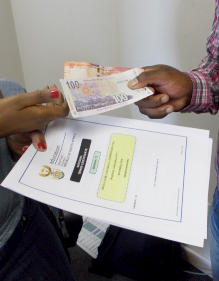 By Kavisha Pillay
By Kavisha Pillay
According to a Corruption Watch survey into corruption in schools, favours in exchange for better marks was singled out as a prevalent form of misuse of power. Results of the survey, which polled 3 284 respondents between the ages of 13 and 34, were released on 30 September, and showed a general perception that corruption is worsening across the country.
With the academic year drawing to a close and learners preparing for their final exams, we take a closer look at the growing trend of selling test and exam papers, and soliciting favours from learners in exchange for higher marks.
Close to 10%, or 380 respondents said that they or learners at their school had to exchange favours for better marks, and 277 told us that exam and test papers are being sold to learners at their schools. This form of corruption strongly implicates teachers, while principals are more likely to be fingered as the main culprits involved in misusing school funds and property.
To date, CW has received over 300 schools reports with abuse of government resources by a public official, employment corruption and corruption in procurement processes reported as the most common types of graft taking place on the school grounds.
To read more about the role of principals click here and to understand your school’s finances click here.
Survey results
Exam season is around the corner and incidences of leaking exam papers and demanding favours for higher marks will be on the rise. The survey reveals that the corrupt practice of selling exams and tests to learners is highest in Gauteng, with Mpumalanga and KwaZulu-Natal close behind, and mainly occurs in public schools.
The data also illustrates that learners in public schools are more frequently asked to solicit favours in exchange for marks, compared to private schools and FET collages. Teachers are the most implicated in this type of corruption, and female learners are seen as common targets. Eastern Cape was the province with the highest number of these accounts, followed by Gauteng and KwaZulu-Natal.
Tjo-tjo for test paper
A report submitted recently to CW reveals that a learner at a private school in Joburg town was going to pay R350 each for maths literacy and tourism question papers. The learner who is paying the bribe notes that he does not have a choice and has to pay the bribe, otherwise he will not receive marks.


In June 2012, the Department of Higher Education and Training presented a report to the parliamentary portfolio committee on education, which implicated 38 exam centres, 29 subjects and 211 candidates in exam leaks.
Some of the findings included evidence of ghost writers, candidates in possession of question papers and copy notes, colleges beginning examination sessions ahead of time, and students helping each other during an exam.
The department found that getting hold of a national exam paper in Durban was extremely easy to many. It was further revealed that students at a number of FET colleges in the city are able to buy leaked exam papers from middlemen both on and off campus.
A source told the Sunday Tribune that “papers were emailed to buyers if the middleman could only obtain them at the 11th hour. Prices ranged from R200-R250 per paper.”
Sexual favours in exchange for marks
CW has received reports that allege learners having to solicit sexual favours in exchange for marks. Because this is an abuse of entrusted power, it’s also regarded as a form of corruption. The number of male and female reporters is balanced, 46% and 54%.
One report says: “Teachers of ******** High School offer grades to female learners for sexual favours. Two learners offered what educators demanded and they were promoted to Grade 12 from Grade 11.”
The recent Transparency International Global Corruption Report on Education states that studies carried out in schools in 15 countries across sub-Saharan Africa, confirm that sexual exploitation of female students by male teachers is widespread. The studies suggest that sexual favours in schools are considered and accepted as a ‘normal’ part of school life in the region.
TI lists consequences of sexual favours:
- Low achievement – students can be discouraged from participating in class and striving for academic excellence out of fear of attracting unwanted attention from teachers
- Disrupted studies and dropout – fear of sexual advances by certain teachers can lead to absence and dropout, resulting in various lost opportunities
- Pregnancy and risk of HIV/Aid – in sub-Saharan Africa there are high levels of dropout amongst female learners because of pregnancy, some as a result of sexual liaisons with teachers
- Health, psychological and social impacts – the risk of sexually transmitted infections, may be accompanied by psychological damage which can contribute to physical and mental ill-health
The cracks in our education system have become seemingly obvious with strong evidence of corruption present at all levels in the learning environment. The effect of corruption in schools is devastating to our country’s youth as it leads to a diversion of resources and a loss of educational opportunities. It erodes the trust between learners and those who are in positions of power, and decreases the value in education.
To report incidences of corruption in schools, we urge you to call CW’s toll-free hotline on 0800 023 456 or visit www.corruptionwatch.org.za.


